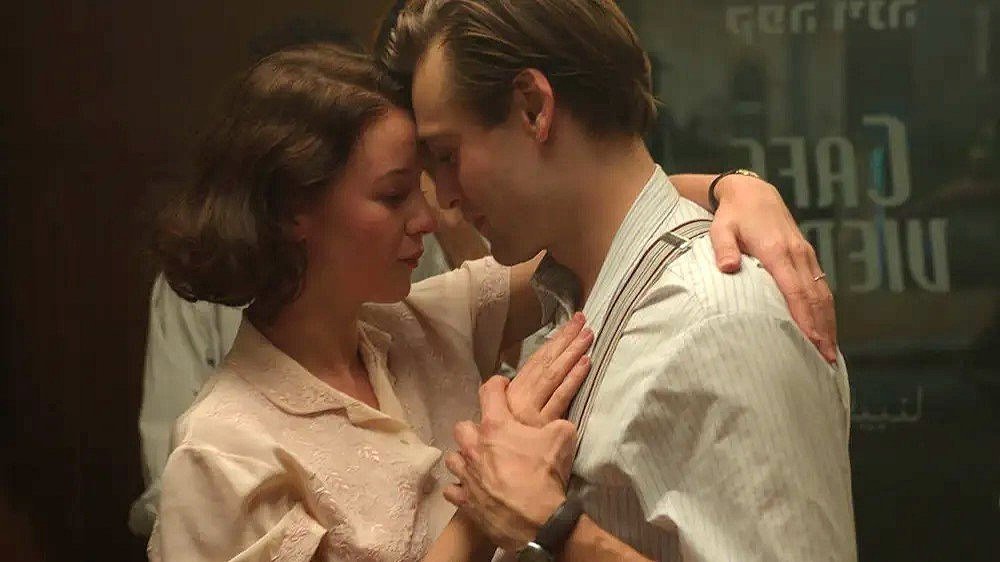Shoshana
Michael Winterbottom’s long-cherished thriller looks back to Palestine in the 1930s and has a sting in its tail now proving all too relevant.
Regardless of any shortcomings Shoshana is a welcome reminder of just how talented Michael Winterbottom is. Never adverse to taking on risky subject matter, he has throughout his career functioned not as a director for hire but as a filmmaker whose projects have always expressed something meaningful to him personally. He has had his failures but never from lack of personal commitment and he is an auteur whose range is extremely wide. This is illustrated by the fact that my own favourites among his films include Wonderland (1999), A Mighty Heart (2007) and the underrated Code 46 (2003).
In the case of Shoshana Winterbottom is making a work which has apparently taken some fifteen years to come to fruition and in which he shares the writing credit with his frequent collaborator Laurence Coriot and with Paul Viragh. It tells a tale set in Palestine that takes place in the late 1930s. That is to say that it portrays that time before the State of Israel was proclaimed when the country was governed by Britain under a League of Nations mandate established in 1922. But, if this makes Winterbottom’s film sound like a remote period piece, the tragic situation now existing in Gaza and the insistence of many Palestinians that the current war needs to be viewed in the light of past history gives it a relevance stronger than might have been foreseen. However, the timing of the film’s release may lead to concern over the fact that the story is one that does not lend itself to expressing at any stage the viewpoint of the Arabs. But it would, I think, be unfair to expect the film to take on issues outside the natural focus of the chosen material.
Shoshana is a film based on showing two contrasting aspects and then depicting the clash between them. On the one hand this is a look at the politics of the time from the viewpoint of both the rulers and the ruled. Several of the central characters are British and among them we meet two men who are part of the British Palestine Police Force: Thomas Wilkin (Douglas Booth) is a Brit who has lived in Palestine for some years and whose outlook is not distanced, but the man appointed as his supervisor is Geoffrey Morton (Harry Melling), somebody whose ruthless nature would likely become apparent in any situation. More representative of the general attitude of the administration is Robert Chambers (Ian Hart) who is there as an aide to the British High Commissioner and who never feels deeply involved or concerned yet believes in the need to carry out his duty. The other side of the political situation lies in the film’s depiction of members of two contrasted groups among the Palestinians. On the one hand there is the Zionist Haganah, an underground military organisation which may arm its members but which is essentially moderate and opposed to terrorist activities. The opposite approach comes from the Irgun. They are freedom fighters under the commandership of men such as Avraham Stern (Aury Alby) and the method they use is to plant bombs. The situation depicted here is certainly specific to its setting but it is also to a great extent representative of what can happen whenever a country falls under the control of a distant one and the resultant attempt at resistance leads to constant retaliations, brutality and the use of informants.
The film’s chosen title is itself a pointer to the importance of the woman who is indeed at its centre. Shoshana is played by Irina Starshenbaum and this role is that of the daughter of a man who had been a founder of Haganah who is herself a supporter of its aims including its adoption of peaceful means. Quite early in the film she and Thomas Wilkin meet and become lovers and it is their love story, not without an echo of Romeo and Juliet, that becomes the other central thread of Shoshana. Against the background of violent extremism depicted potently enough to remind one of the classic 1966 film The Battle of Algiers, Shoshana sets the humanity of the lovers to which we the audience respond. But it then goes on to ask if such love can survive and where it could lead. Here, indeed, the film suddenly seems spot-on as a comment on Gaza today.
It would be great to be able to proclaim Shoshana a fine work, but it is actually a mixed bag. Irina Starshenbaum shines in the title role, but Douglas Booth is not ideal casting for Thomas Wilkin and Harry Melling’s villainous policeman is decidedly one-note. Although shot in Apulia, Italy the film’s representation of Tel Aviv convinces and the period sense is excellent. However, the otherwise adroit music heard feels misjudged when it tries to turn Gershwin’s ‘The Man I Love’ into a theme tune for the film. Technically the film offers first-class work in all respects including the photography by the admirable Giles Nuttgens, the editing by Marc Richardson and the wonderfully fluid direction by Winterbottom who adroitly sustains a two-hour running time. Despite its weaknesses, Shoshana contains much to admire and to appreciate and, as I have indicated, the ending is all the more powerful for being seen at this time.
MANSEL STIMPSON
Cast: Douglas Booth, Irina Starshenbaum, Harry Melling, Aury Alby, Giną Bramhill, Ian Hart, Daniel Donskoy, Rony Herman, Yotam Ishay, Doron Kochavi, Yarden Lavi, Ariel Nil Levy, Gal Mizrav, Bouchaib Chtiwi.
Dir Michael Winterbottom, Pro Melissa Parmenter, Josh Hyams, Luigi Napoleone, Massimo Di Rocco and Michael Winterbottom, Screenplay Michael Winterbottom, Laurence Coriat and Paul Viragh, Ph Giles Nuttgens, Pro Des Sergio Tribastone, Ed Marc Richardson, Music David Holmes, Costumes Anthony Unwin.
Revolution Films/Bartlebyfilm-Altitude Film Entertainment.
120 mins. UK/Italy. 2023. UK Rel: 23 February 2024. Cert. TBC.


